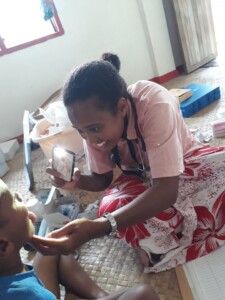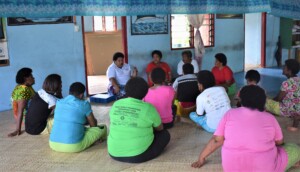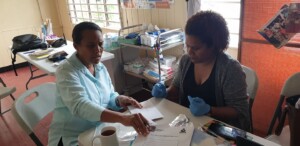Healthy choices transform lives
June 3, 2020

By Erica Lee
Pap smears!
That’s what most people think when they hear about Medical Service Pacific (MSP), a rights-based health and social services non-government organisation based in Fiji.
Opened in 2010, MSP’s core mandate was to provide mobile clinical outreach programs delivering information and clinical services (sexual and reproductive health and rights – SRHR) it has evolved into an organisation that provides a range of development services to vulnerable communities across Fiji.
MSP’s services go beyond women’s health and family planning, it also offers counselling and legal services to women and youth especially those who have experienced sexual assault, violence, disaster conflict and other forms of trauma and abuse. MSP also offers humanitarian assistance, training on gender equality, child protection, climate change adaption and environmental health.
With over half Fiji’s population below the age of 40, ongoing sexually transmitted diseases and high rates of teenage and gaps in sexual reproductive health services easily available, MSP’s services are critical to improving the health outcomes of women and girls. Another concern for women in Fiji is the 60% cancer (breast and cervical) mortality because of late detection and presentation to the hospitals.
With offices in Suva, Labasa and soon to open in Lautoka, annually MSP assists over 20,000 clients. MSP has 21 full-time staff and five volunteers of which five are medical staff and seven are Counsellors. On average Counsellors may see 10 clients a day and post-rape services provided to 2-4 sexual assault survivors.
In 2018, the Fiji Women’s Fund provided an FJD $313,600 grant to MSP to help it extend its services to reach marginalised and vulnerable women and girls in the furthest communities in Fiji. The project reached the maritime islands of Lau, Lomaiviti, Kadavu and Rotuma.
Maritime Outreach Project
The MSP team sometimes travels for days, crossing rivers in small punts, trekking treacherous terrains to reach women and girls in the furthest corners of Fiji, spending more than half a day trying to reach these communities and at times returning late at night.
Country Director Ashna Shaleen says that it was important to expand their services to remote and rural areas because nearly half of Fiji’s population (44.1%) reside in rural areas. She added that the Maritime Outreach Project had also led to the detection of high rates of cancer abnormalities and sexually transmitted diseases.
One significant achievement of the project was MSP’s roll-out of the Girl Empowered Program in maritime schools which empowers girls and women through a combination of health education and family planning. MSP also distributed Days for Girls kits which contain reusable sanitary products, liners, panties, a washcloth, soap, and zip-lock plastic bags enabling girls to carry their clean and used pads discreetly and to take care of their own hygiene needs. The programme also provides awareness which they hope will break stigmas and cultural taboos associated with menstruation. The kits were purchased from the project funds and also through MSP’s partnership with the Uplift Project.
The Maritime Outreach Project reached a total of 5,826 clients (3,099 women and 2,727 men) and 7,652 clients (4,036 female and 3,616 male) in 2018 and 2019 respectively.
Shaleen said the outreach program was also having a positive impact on changing communities’ perceptions to SRHR and that following some of these awareness sessions, they have continued to receive referrals to their main offices in Labasa and Suva.
Ending violence against women and girls
 Seeing that there was a gap in post-rape care and support for survivors of sexual assault and violence, MSP also extended its services and now runs Fiji’s largest Post Rape & Sexual Assault Care and Fiji’s National Child Helpline.
Seeing that there was a gap in post-rape care and support for survivors of sexual assault and violence, MSP also extended its services and now runs Fiji’s largest Post Rape & Sexual Assault Care and Fiji’s National Child Helpline.
Shaleen said that while providing SRHR education and training, MSP became increasingly aware of many cases of rape and sexual assault of women and children that went unreported. Also, noting a lack of support available for survivors to access justice or other forms of healing.
“We saw so many women suffering in silence and we could no longer be a silent observer to these injustices. We designed our extended services to be a one-stop shop for survivors – where they can access post-rape care, crisis care, medical care and legal assistance. Providing support to rape survivors requires adequate, timely and holistic response to sexual assault,” explained Shaleen.
Every case is handled with the utmost care and confidentiality to ensure that survivors feel confident in MSP’s services and professionalism. The trauma of being raped or sexually assaulted can leave survivors feeling scared, ashamed, and alone or many of them will continue to experience flashbacks, and other unpleasant memories.
MSP gets referrals from the Fiji Police Force, the Colonial War Memorial hospital, and also from walk-ins asking for assistance. The process involves providing counselling and a sexual assault forensic exam, sometimes known as a “rape kit,” to preserve possible DNA evidence and to administer important medical care to victims. After test results are received, MSP presents the evidence to the Police and Director of Public Prosecutions. Doctors and Counsellors from MSP have on occasion been called to testify as expert witnesses in sexual assault cases.
MSP has also received reports while in the field and they have at times had to assist survivors of sexual assault and domestic violence to flee from their husbands or a perpetrator that lives in their community. In these code red situations, MSP acts immediately to provide escape plans, fares for boats, and removal to a safe house. They also follow up on these clients over a period of time to monitor any further danger or backlash that the survivors might face and ascertain what further support they may need.
The nature of this work has meant that MSP staff have received harassment and threats from members of the public especially men who were not happy with the advice or support given to their families. To ensure the safety of their staff and their clients, MSP has taken precautionary measures such as installing cameras and panic buttons in their offices. They also ensure that all visits to communities are accompanied by representatives from the provincial council, social welfare and a Police Officer.
Partnering with relevant authorities
 To strengthen coordination and to enhance the outcome of their work, MSP has formal agreements with government ministries and agencies like the Ministry of Women, Children and Poverty Alleviation (MWCPA), the Ministry of Youth and Sport, the Ministry of Education, Ministry of Health and Medical Services, the Fiji Police Force, the Legal Aid Commission and various other entities, MSP is able to ensure that pathways to immediate support, medical care and justice can be rendered to clients.
To strengthen coordination and to enhance the outcome of their work, MSP has formal agreements with government ministries and agencies like the Ministry of Women, Children and Poverty Alleviation (MWCPA), the Ministry of Youth and Sport, the Ministry of Education, Ministry of Health and Medical Services, the Fiji Police Force, the Legal Aid Commission and various other entities, MSP is able to ensure that pathways to immediate support, medical care and justice can be rendered to clients.
MSP has also provided training and works with authorities to develop protocols when it comes to dealing with survivors. For instance, medical professionals are trained on how best to treat and interact with survivors and when working with children, MSP ensures that all necessary care is taken e.g. when bringing referrals to MSP, Police ensure that a child is not identified by their uniform or transported in Police marked vehicles that would draw attention to them. They also help the Police team with proper procedures to collecting forensic evidence in sexual assault cases.
Working with the Ministry of Education and funded by the Australian Government’s Fiji Program Support Facility (the Facility), MSP provides three rotational Counsellors to high schools in the central division classified as high risk – those that have had cases of bullying, sexual assault/violence, substance abuse and truancy. In 2019 alone, there were 6,000 cases of school bullying according to the National Substance Abuse Advisory Council[1].
Humanitarian Support
MSP also responds to disasters, conflict and humanitarian emergencies in partnership with local and national governments and agencies; and provides climate change and environmental health-related technical support services.
For an in-depth view of MSP’s humanitarian support, click here to read about their coronavirus and tropical cyclone Harold response in March – April this year. To access MSP services or find out how you can support MSP, please visit their website: http://msp.org.fj/
[1] https://www.fbcnews.com.fj/news/highest-bullying-cases-recorded-in-suva-schools/
Photo credit: Medical Services Pacific
Recent Whats New
“She Sees Me Play”
June 30 2025
Women Lead Climate Action in Yavusania Village
June 29 2025
A Safe Haven for Women
June 20 2025
Victoria Yee appointed as Executive Director
April 1 2025
Leading Gender-Based Violence Awareness in Vanua Levu
March 19 2025
